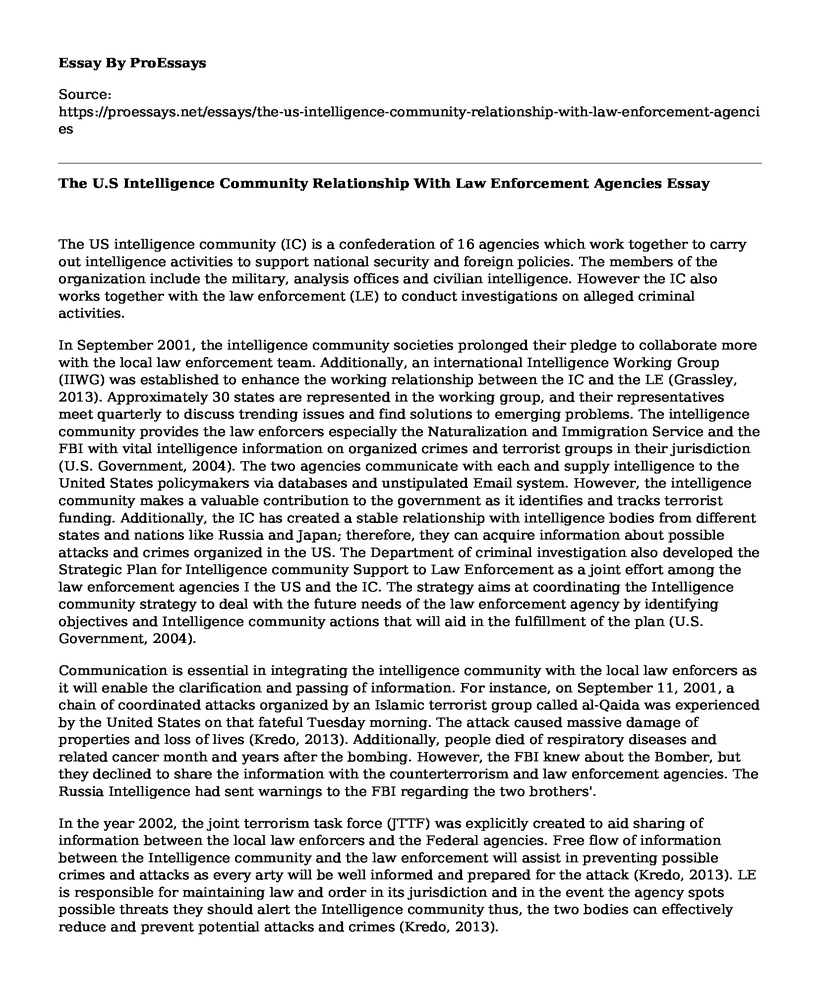The US intelligence community (IC) is a confederation of 16 agencies which work together to carry out intelligence activities to support national security and foreign policies. The members of the organization include the military, analysis offices and civilian intelligence. However the IC also works together with the law enforcement (LE) to conduct investigations on alleged criminal activities.
In September 2001, the intelligence community societies prolonged their pledge to collaborate more with the local law enforcement team. Additionally, an international Intelligence Working Group (IIWG) was established to enhance the working relationship between the IC and the LE (Grassley, 2013). Approximately 30 states are represented in the working group, and their representatives meet quarterly to discuss trending issues and find solutions to emerging problems. The intelligence community provides the law enforcers especially the Naturalization and Immigration Service and the FBI with vital intelligence information on organized crimes and terrorist groups in their jurisdiction (U.S. Government, 2004). The two agencies communicate with each and supply intelligence to the United States policymakers via databases and unstipulated Email system. However, the intelligence community makes a valuable contribution to the government as it identifies and tracks terrorist funding. Additionally, the IC has created a stable relationship with intelligence bodies from different states and nations like Russia and Japan; therefore, they can acquire information about possible attacks and crimes organized in the US. The Department of criminal investigation also developed the Strategic Plan for Intelligence community Support to Law Enforcement as a joint effort among the law enforcement agencies I the US and the IC. The strategy aims at coordinating the Intelligence community strategy to deal with the future needs of the law enforcement agency by identifying objectives and Intelligence community actions that will aid in the fulfillment of the plan (U.S. Government, 2004).
Communication is essential in integrating the intelligence community with the local law enforcers as it will enable the clarification and passing of information. For instance, on September 11, 2001, a chain of coordinated attacks organized by an Islamic terrorist group called al-Qaida was experienced by the United States on that fateful Tuesday morning. The attack caused massive damage of properties and loss of lives (Kredo, 2013). Additionally, people died of respiratory diseases and related cancer month and years after the bombing. However, the FBI knew about the Bomber, but they declined to share the information with the counterterrorism and law enforcement agencies. The Russia Intelligence had sent warnings to the FBI regarding the two brothers'.
In the year 2002, the joint terrorism task force (JTTF) was explicitly created to aid sharing of information between the local law enforcers and the Federal agencies. Free flow of information between the Intelligence community and the law enforcement will assist in preventing possible crimes and attacks as every arty will be well informed and prepared for the attack (Kredo, 2013). LE is responsible for maintaining law and order in its jurisdiction and in the event the agency spots possible threats they should alert the Intelligence community thus, the two bodies can effectively reduce and prevent potential attacks and crimes (Kredo, 2013).
Conclusion
In conclusion, the intelligence community and the local law enforcement bodies should work together to ensure the safety of the citizens. The relationship between the two bodies has improved and become stronger over the years however, they should ensure there is an open and transparent sharing of information in order to prevent future attacks and threats from terrorists.
References
Grassley, C. R. (2013). Intelligence sharing in wake of Boston marathon bombings. Prepared Floor Statement of Senator Chuck Grassley of Iowa, Ranking Member, Senate Judiciary Committee. ProQues. Washington, DC:: Office of Senator Grassley.
Kredo, A. (2013). Failure to communicate. (T. W. Beacon, Ed.) Retrieved from Intelligence sharing could have helped prevent Boston marathon bombing: http://freebeacon.com/national-security/failure-to-communicate-2/
U.S. Government. (2004). Intelligence reform and terrorism prevention act of 2004. Retrieved from http://www.gpo.gov/fdsys/pkg/PLAW-108publ458/pdf/PLAW-108publ458 pdf
Cite this page
The U.S Intelligence Community Relationship With Law Enforcement Agencies. (2022, Jun 22). Retrieved from https://proessays.net/essays/the-us-intelligence-community-relationship-with-law-enforcement-agencies
If you are the original author of this essay and no longer wish to have it published on the ProEssays website, please click below to request its removal:
- Essay Sample on Politics of Criminal Justice
- Non-Verbal Communication Essay
- Ethics Journal Entries: Accounting Ethic Essay
- Immigrants: The American Dream and A Chance to Succeed - Essay Sample
- Females in Imperial China: Learning & Limitations in Ancient Times - Essay Sample
- Was Nelson Mandela a Hero? - Essay Sample
- Essay Example on Familiarity Makes Conversation and Communication Easier







